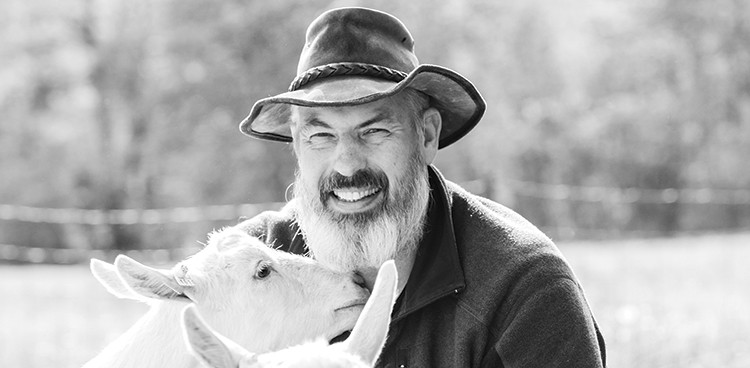
Prairie Breeze, Evalon, Everton, Lindsay Bandaged Goat Cheddar—what do all these cheeses have in common? Scads of awards, thanks in part to star dairy consultant Neville McNaughton. Growing up on a remote, 30-cow farm that sold milk to a local cheese factory, the New Zealand native witnessed the challenges of small-scale farming early on. After earning a dairy technology degree, honing his cheesemaking skills, and co-founding premier Kiwi cheese brand Kapiti, McNaughton moved to America to put his expertise to work. In 2001, he opened a consulting company, CheezSorce, and since then, McNaughton has assisted more than 100 artisan creameries in sourcing equipment and developing recipes for some of North America’s most decorated wheels and wedges. We caught up with the St. Louis–based expert and competition judge to talk about gumbo, motorcycling, and the state of American cheese.
ON ADVICE FOR ASPIRING MAKERS
In many cases, cheesemakers are setting off on a journey for which they don’t have training—just sheer passion and drive. Focus on quality, self-educate, and check everything that you think you know. [There are] a series of courses you can take: a five-day course at the
Center for Dairy Research in Wisconsin, a course at
Washington State University in Pullman, or
Jasper Hill Farm’s courses at Sterling College in Vermont.
ON THE MOST MEMORABLE KIWI MEAL
Welsh lamb with lots of gravy, mint sauce, and the usual roast vegetables. We had a coal stove and my mother would cook a roast every Sunday. We’d cook the whole forequarter and eat the chops. The rest of the week, we’d carve meat off it and eat it cold or we’d run it through a grinder and make shepherd’s pie.
ON SOUTHERN CUISINE
My wife comes from Louisiana and the best family reunions I have ever been to were with her family. All that gumbo and jambalaya and étouffée. They make an incredibly good meal out of simple ingredients. It’s peasant food that became gourmet.
ON TASTING LIKE A PRO
Take a modest amount of cheese—smell it, rub it between your fingers to understand its texture and warm it, smell it again, and taste it. Sometimes I’ll take a second sample and taste again, so my palate gets to experience the texture. Between bites I have water, crisp apples, or soda water to wipe my palate clean.
ON CHEESEMAKING VS. CONSULTING
I love to make cheese. When I took my first job in a cheese plant, I never even thought about having another job for the first five years. But there was no training, nobody who could answer questions, nobody to help. Once I realized I could do all of these things . . . I fell into a job that I didn’t know needed to be done. And it fits me. I don’t want to go back and make cheese. I’m too old, and it’s way too hard. [Laughs]. And I really enjoy helping people.
ON TRAVELING
On my motorcycle—if I have free time, that’s where I’ll be. All winding roads in America are destinations for me. In the hills of Virginia, Georgia, North Carolina . . . where roads are winding, food and culture are preserved.
ON CURRENT CURD HOTSPOTS
The Southeast is booming—Georgia, North Carolina. The Cincinnati area is looking interesting as well; it already has one urban creamery and it’s getting two more.
ON THE AMERICAN FOOD SYSTEM
The small farmer is passionate about his product and knows quality food. But the weight of the world is against him. The system is designed for large-scale producers. We’ve got large corporations using every ingredient under the sun and spending most of their time formulating food rather than simply taking a food we already have and presenting it to a customer. In the process of changing food, we don’t make it better. We’re fighting an incredible fight about the definition of good food…in the next couple of years, you’ll see a lot of discussion about that.
Feature Photo Credit: Jennifer Silverberg
Former Senior Editor Molly McDonough worked for cheesemakers in Switzerland and the US before earning a Master's degree in Agriculture and Food Science at the Ecole Supérieure d'Agriculture in Angers, France. After spending a year in Romania working on rural development projects with Heifer International, she returned home to Boston and joined the culture team in 2015.












